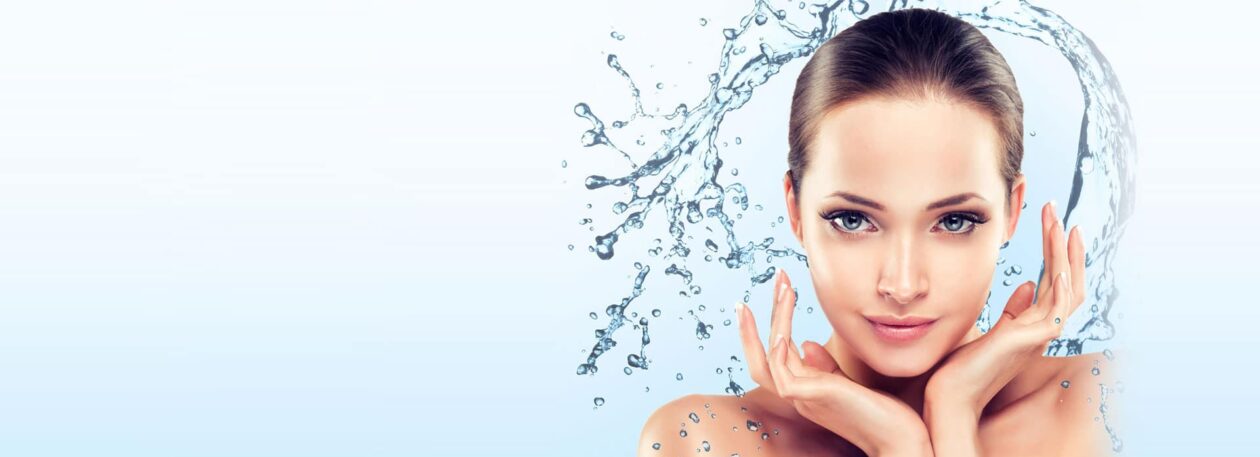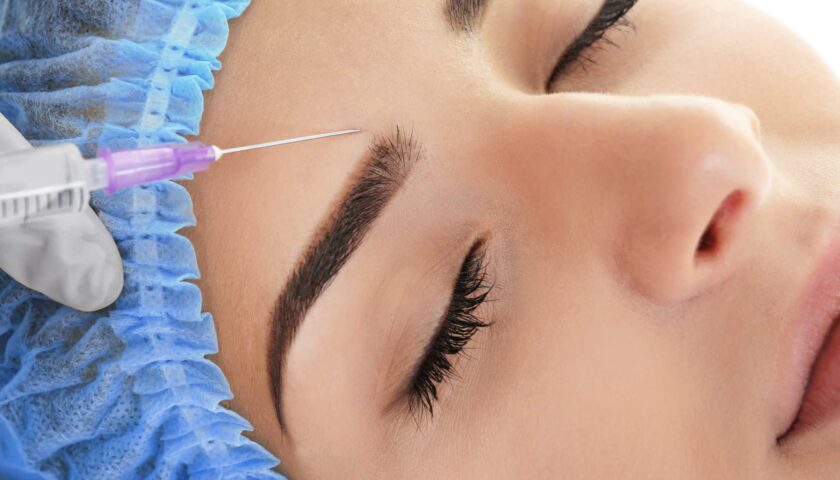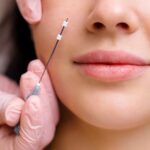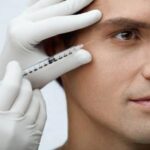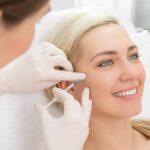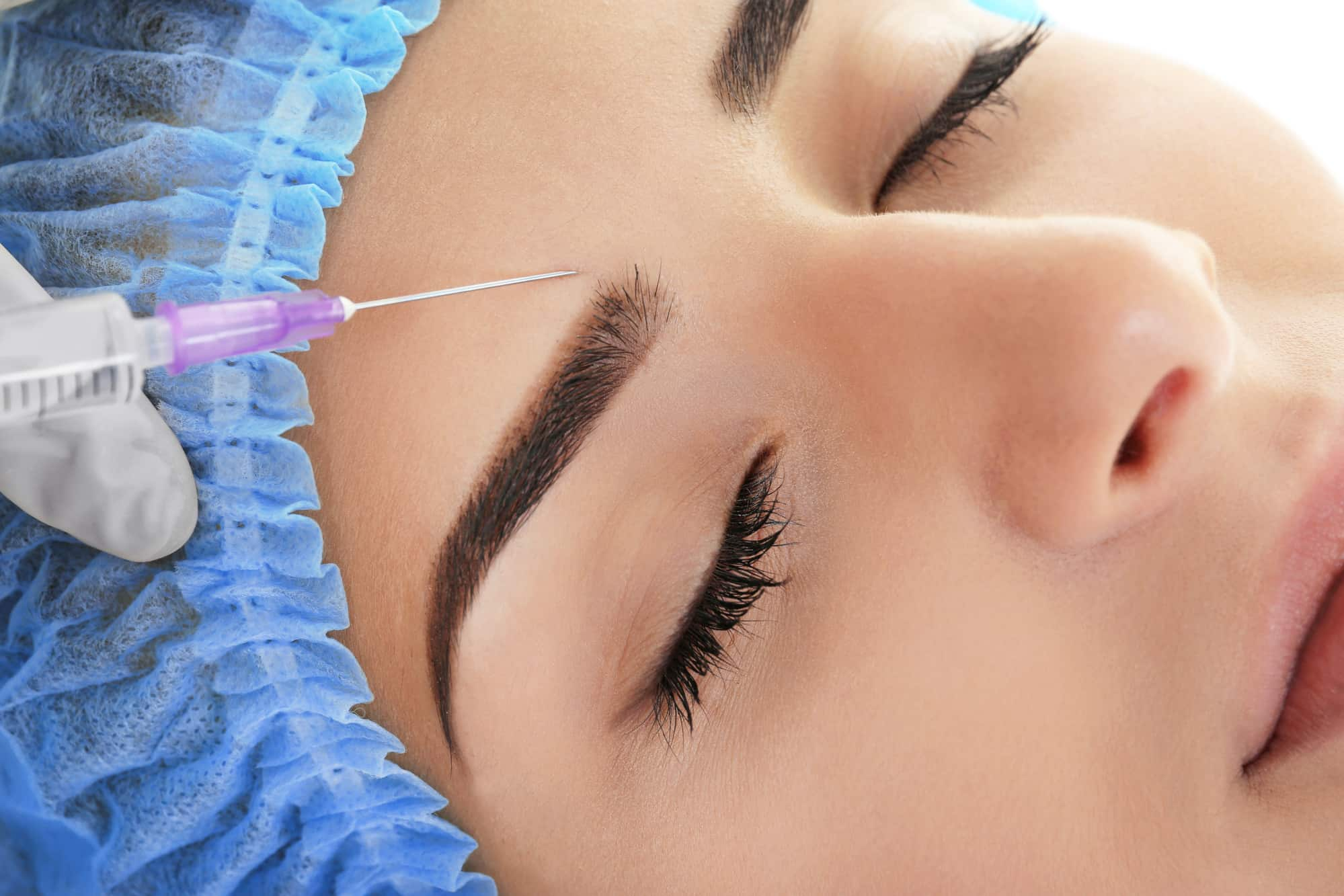
Active facial expressions and age-related changes over time lead to the appearance of skin folds or wrinkles on the forehead. Additionally, a pronounced asymmetry and dropping of the eyebrows can happen as we age. Botox eye lift helps to solve aesthetic problems and significantly improve one’s appearance. Medication based on botulinum toxin allows for lifting the eyebrows, changing their direction, correcting their shape, and even achieving the desired curve, so let’s dive into the Botox brow-lifting procedure.
How Botox Works
Botox, derived from a natural source, exhibits a notable neurotoxic effect, although the pure form of botulinum toxin is not utilized directly. Instead, through meticulous laboratory purification, this potent toxin is processed using a specialized method. Once this purification process is completed, medications containing botulinum toxin become suitable for cosmetic applications. The selected medicine is then skillfully injected into the targeted region where a specific facial muscle resides. Following the injection, the muscle promptly relaxes, resulting in a remarkable smoothing of the skin’s texture.
Consequently, even deeply entrenched and prominently visible facial wrinkles fade away. Furthermore, the epidermis’s natural lipid and water equilibrium is restored, operating at profound cellular levels. The outcome is astonishingly smooth, rejuvenated, and supple skin. Botox is an exceptional alternative to surgical interventions and its effectiveness is comparable to facial contouring procedures.
Botox for Brow Lift Explained
Botox is commonly used to lift eyebrows by targeting specific muscles in the forehead and eye areas. The product contains botulinum toxin type A, which acts by temporarily blocking nerve impulses to the injected muscles. Doing so reduces muscle activity and relaxes the muscles responsible for pulling the eyebrows downward.
During the procedure, small amounts of Botox are injected into precise locations, typically around the eyes and the upper outer part of the eyebrows. By targeting these specific areas, the muscles that cause frowning are relaxed, allowing the eyebrows to lift naturally.
In addition to lifting the eyebrow, Botox injections can also help reduce wrinkles between the eyebrows, often referred to as “frown lines” or “glabellar lines.” The muscles are further relaxed by injecting Botox in this area, resulting in a smoother and more youthful appearance.
Bear in mind that the effects of Botox are only temporary, typically lasting for several months. Muscle activity resumes as the Botox gradually wears off, and the eyebrows may return to their original position. Therefore, repeat treatments with Botox to raise eyebrows are necessary if patients want to maintain the desired results.
Preparation for the Procedure
Brow lifting with Botox is considered a relatively simple and safe technique and requires almost no preparation from the patient. Still, they should comply with the following:
- Avoid alcohol a few days before the session;
- Steer clear of medications that affect blood clotting;
- Hold off on acid peeling and other traumatic procedures for at least one to two weeks before the session;
- Consult with a cosmetologist.
The specialist must assess the indications and contraindications for the procedure, identify possible allergic reactions and locate the injection zones before the treatment.
Injection Procedure
The lifting of the eyebrow line occurs in the following sequence:
- Cleansing of the skin. It allows removing traces of cosmetic products, dust, and dirt from the tissues to eliminate the risk of infection.
- Marking of the area. Points of injection of the product are marked, considering the desired result – reducing eyebrow drooping, eliminating asymmetry, or removing skin folds.
- Preparation of the product. The necessary amount of units is diluted with a saline solution, and syringes for the injections are prepared.
- Performing the injections. The product is injected into the pre-marked points.
- Antiseptic treatment. Repeat treatment with an antiseptic solution, and a soothing agent is applied to prevent swelling and bruising.
The total session duration is no longer than 30-40 minutes. The effects do not appear immediately but gradually after a few days, and the final results can be assessed after approximately two weeks.
Benefits & Side Effects
Now, let’s talk about the advantages and side effects of doing an eyebrow lift with Botox.
Benefits
Lifting the tips of the eyebrows and correcting the arch using Botox is a reasonably effective and straightforward procedure. It does not require long-term preparation or a complex rehabilitation period.
Eyebrow lifting with Botox offers several notable advantages:
- Affordable cost;
- Minimal pain;
- Inconspicuousness of the procedure to others;
- Safe and minimally invasive procedure;
- Results last for several months at least.
Side Effects
Like any other cosmetic injectable procedure, Botox has certain limitations and contraindications.
Firstly, it is administered through an injection, which means that, like any other injection, it can result in a small bruise or hematoma that will resolve within a few days.
Additionally, it can also cause a mild headache, which usually subsides within a day or two. It’s also important to remember that botulinum toxin, the main active component of Botox, Dysport, and Xeomin, is a protein, so individual allergic reactions are possible.
Other possible effects may include:
- Involuntary muscle spasms (typically observed after injections around the eye area);
- Facial muscle paralysis (Botox is usually used to induce partial muscle paralysis and prevent wrinkles, but in extremely rare cases, the paralysis can make the whole face appear mask-like);
- Drooping eyebrows;
- Severe swelling;
- Significant subcutaneous bleeding (bruising);
- Impaired upper lip mobility (when the product is injected into nasolabial folds);
- Severe headaches.
It’s crucial to consult with a qualified professional who can provide detailed information about the potential side effects and risks associated with Botox brow lift and address any specific concerns you may have before proceeding with the treatment.
Aftercare
During the recovery period, please adhere to the following guidelines:
- For the first hour after the procedure, perform active facial expressions to help the Botox distribute better within the tissues;
- Avoid lying down horizontally for at least four hours;
- Refrain from using cosmetics for a couple of days;
- Avoid massaging the face for the first 24 hours after the injections;
- Refrain from consuming alcohol for five to seven days;
- Limit physical exertion for at least a week;
- Avoid taking antibiotics and analgesics for several days;
- Stay away from saunas, steam rooms, or tanning beds for seven to ten days.
Following these guidelines will help accelerate skin recovery, prevent side effects, and achieve pronounced and long-lasting results for your brow lift.
FAQ
How long does a Botox brow lift last?
The duration of a Botox brow lift can vary depending on individual factors, like dosage or metabolism. Generally, the effects of a brow lift with Botox can last between three to four months. However, it’s important to note that each person’s approximate timeframe can vary and it can be shorter or even much longer in some cases.
How many Botox units for a brow lift?
The number of Botox units required for a brow lift can vary depending on individual factors, including the extent of correction desired and the patient’s specific anatomy. However, on average, a brow lift procedure may require four to eight units for the outer brow and 10 to 30 units of Botox for the glabella.
What is the risk of Botox brow lift?
The risks associated with a Botox brow lift include potential bruising or bleeding at the injection site, temporary muscle weakness or drooping, and rare allergic reactions. Therefore, consulting with a qualified healthcare professional for a comprehensive assessment of your individual risks before undertaking a procedure is essential.
Injectable aesthetics are popular due to their ability to provide noticeable results with minimal downtime compared to surgical procedures. They are versatile and can be tailored to meet individual aesthetic goals, whether it's enhancing lips, restoring facial volume, or smoothing out wrinkles. However, they should always be administered by qualified professionals to ensure safety and achieve optimal results.
Injectable aesthetics are used to enhance facial features, reduce the signs of aging, and improve overall facial symmetry and appearance.
Key types of injectable aesthetics include:
-
Dermal Fillers: These injectables are used to add volume, fill in wrinkles and folds, and enhance facial contours. They often contain substances like hyaluronic acid, collagen, or calcium hydroxylapatite, which help plump up the skin and smooth out fine lines and wrinkles.
-
Botulinum Toxin (Botox): Botulinum toxin injections temporarily relax facial muscles that cause wrinkles and lines to form. It is commonly used to treat forehead lines, frown lines between the eyebrows, and crow's feet around the eyes.
-
Collagen Stimulators: These injectables stimulate the body's own collagen production, helping to improve skin texture and firmness over time. Examples include poly-L-lactic acid (Sculptra) and calcium hydroxylapatite (Radiesse).
-
Neurotoxin Injections: Besides Botox, other neurotoxins such as Dysport and Xeomin are used similarly to reduce wrinkles and lines.
